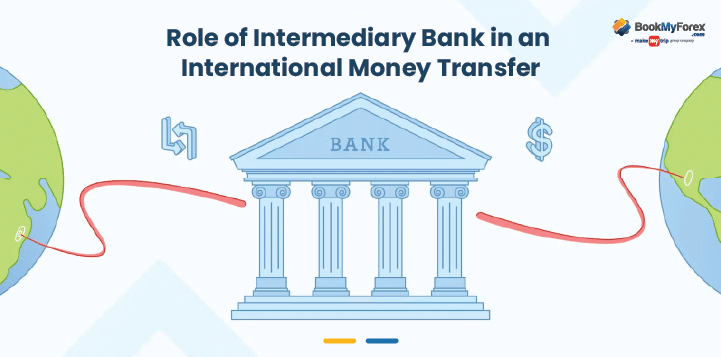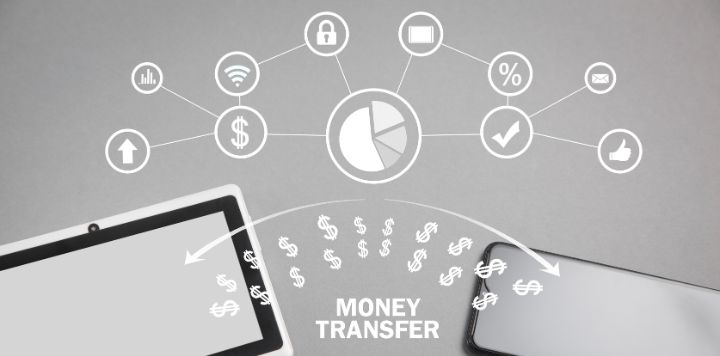Summary: The fees charged by intermediary banks are an integral part of the international money transfer process, impacting the final amount received by the recipient. Know more about the intermediary bank fee and how intermediary banks bridge the gap between sending and receiving banks.
When it comes to international money transfers, most banks and fintech platforms don’t have the networks to transfer money directly to other foreign banks around the world. Banks often rely on the assistance of another type of financial institution, known as an intermediary bank, to handle such international transactions and in return, the intermediary bank collects a fee for their service. That’s where intermediary bank fees come into play. Money transfers abroad are almost always subject to this charge.
Intermediary banks play an important role in international money transfers. The purpose of this blog is to provide a comprehensive guide to intermediary bank fees.
What is an Intermediary Bank?
An international money transfer a.k.a wire transfer moves money from one bank to another. In theory, there should only be two parties involved:
- The sending (remitting) bank
- The receiving (beneficiary) bank
International money transfers, however, often involve other parties, like an intermediary bank. The term refers to any third party or additional bank standing between the institution remitting the funds and the institution receiving the funds. In other words, the intermediary or correspondent bank is a middleman between the two endpoints, whose services are seldom free.
As an example, let’s take Anuj, a businessman in India, who wants to send money abroad to his daughter Sneha, studying at a foreign university in the USA. The following example illustrates a cross-border payment between two countries.
Anuj instructs a bank/fintech platform (A) in India to send funds to Sneha’s bank (C). Due to the fact that his bank does not have an account with Bank C, the funds must be routed through an intermediary bank (B) to enable the money transfer to take place.
What Is the Need for an Intermediary Bank?
Now that you know what an intermediary bank is, you’d be wondering, why is an intermediary bank required to facilitate the transaction between two banks. Couldn’t the two banks just transfer money directly?
The reason for the need for intermediary banks for wire transfers is that banks based in different countries may not have a financial relationship with one another. They might use different currencies and networks. Hence, a third-party intermediary bank will translate and facilitate the transaction between the two parties. Here is a more detailed explanation of what an intermediary bank does!
Role of an Intermediary Bank in an International Money Transfer:
- Routing and Processing: The sender’s bank initiates the international money transfer. However, the sender’s bank may not have a direct relationship with the recipient’s bank in the foreign country. Hence, the sender’s bank will use an intermediary bank to route the funds.
- Currency Conversion: In international transfers, the sender’s bank and the recipient’s bank deal in different currencies. The intermediary bank may facilitate the currency conversion, if necessary. They exchange the sender’s currency for the currency used by the recipient’s bank at prevailing exchange rates.
- Risk Mitigation: Intermediary banks often act as middlemen between two banks and mitigate risks associated with cross-border transactions. They verify the authenticity of the transaction, ensure compliance with international regulations, and help prevent fraudulent activities.
- Compliance and Regulatory Requirements: Intermediary banks play a role in ensuring that the international transfer complies with all relevant international and domestic financial regulations.
- Transaction Tracking: Intermediary banks aid in monitoring the transfer’s progress, ensuring secure delivery to the recipient, and maintaining detailed transaction records. They also provide status updates to the sender’s bank.
- Communication: Intermediary banks facilitate communication between the sender’s and recipient’s banks by sharing information related to the transfer, including any specific instructions, to guarantee a smooth flow of funds.
- Settlement: Upon the successful transfer of funds from the sender’s bank to the intermediary bank and then to the recipient’s bank, the intermediary bank ensures that both institutions settle their respective accounts to close the transaction.
What Are the Fees Charged by Intermediary Banks?
The fees charged by intermediary banks are not standard, and neither remitting nor beneficiary banks can tell customers what they’ll pay. The reason for this is primarily due to the fact that the intermediary bank that will be used will differ according to the currency of the payment, the beneficiary bank, as well as the destination country.
There may also be variations in fees depending on the relationship an intermediary bank has with the relevant remitting/beneficiary bank. It is possible, for example, that the fees may be slightly reduced if either party consistently uses the same intermediary bank.
In general, intermediary fees range from $15 to $30 per transaction. It is often frustrating for customers as it can be expensive, especially if the customer initiates multiple international wire transfers in a financial year. Another thing to remember is that intermediary bank fees aren’t the only fees associated with money transfers abroad. You’ll also need to consider:
- Remitting/Beneficiary Bank Fee
- Transfer Charges/Service Fee
- Markup fees on exchange rates
Money transfers abroad cost more when hidden forex markup & high fees are added to the transaction. Banks mark up the base exchange rate, so make sure to do some research and avoid using a service provider that charges high markup fees.
Different Ways to Pay the Intermediary Bank Fee
SWIFT Standard field 71A “Details of Charges” specifies the following three methods of collecting Intermediary Bank Fees:
- OUR – An “OUR” indication in the SWIFT message means the sender pre-pays the fee of the intermediary bank. The sender’s bank will collect the intermediary fee (usually US$ 15-30) and will be responsible for settling it with the third-party banks. No fees will be collected from the transfer by the intermediary banks. The complete amount will be deposited as it is into the beneficiary’s account.
- SHA – If “SHA” is marked in the SWIFT payment message, it indicates that the sender will pre-pay half of the intermediary bank charge to the sending bank. This half will be paid to the intermediary bank by the sending bank. The beneficiary would be responsible for paying the remaining half of the “intermediary bank charge”. This half-charge will be collected by the intermediary bank from the amount being transferred.
- BEN – The beneficiary is responsible for payment of the entire intermediary fees. Say you’re sending $10,000 abroad, and the intermediary bank charges $20. In this case, the intermediary bank will take $20 from the amount being sent. In the end, $9,980 will be credited to the beneficiary’s account.
Tips to Minimize the Intermediary Bank Fees
While intermediary bank fees are unavoidable in most international transactions, here are some tips to minimize their impact:
- Research Different Platforms: Different platforms or service providers may have varying fee structures for intermediary bank services. Research and compare the fees charged by different banks before choosing one for your international money transfers.
- Be Informed: Always review the terms and conditions, complete fee structures, and the exchange rate offered by the bank or fintech platforms before initiating an international transfer. Ensure that there are no hidden fees associated with your transactions.
- Consolidate Transactions: If possible, consolidate multiple smaller transactions into a single larger transaction. This can help reduce the overall fees associated with international money transfers including the intermediary bank charges.
- Negotiate with Your Provider: If you frequently engage in international transactions, consider negotiating with your service provider for lower fees. Some platforms may be willing to offer better terms to retain high-value customers.
Wrapping Up
Intermediary fees are a crucial part of the international banking system. The reason they are so important is that they streamline international transfers from the remitting bank to the beneficiary. Together, they form an international banking network that lets money move across the globe seamlessly.
At BookMyForex, we are always dedicated to putting our customers’ savings first. While intermediary bank charges are unavoidable, we offer zero transfer charges on international wire transfers in order to keep the overall transfer cost for customers as low as possible. We also provide you with transparent rates to ensure you get the best possible deal.



























